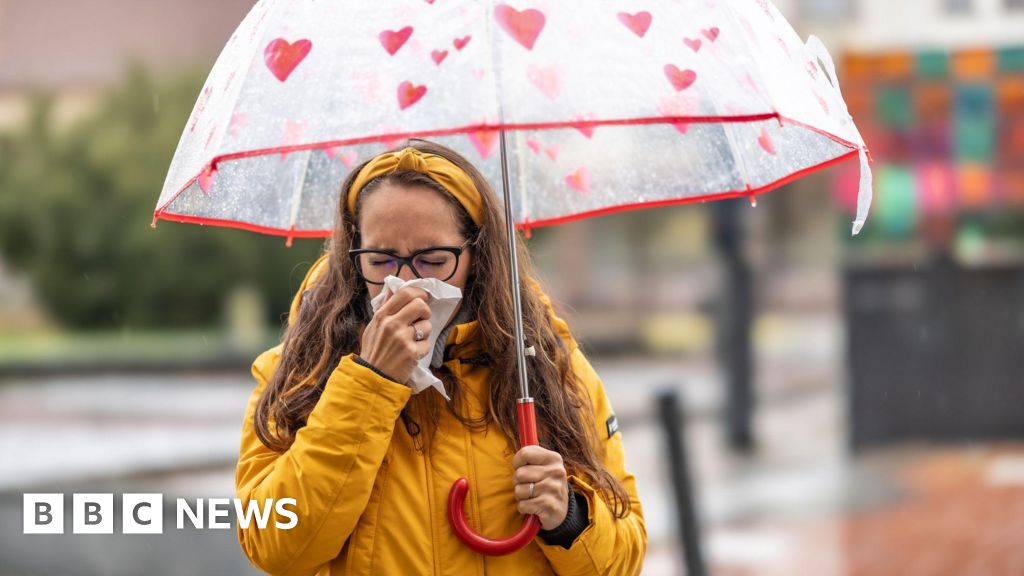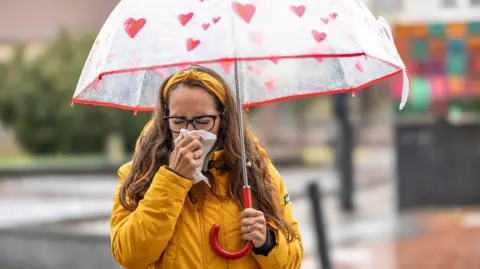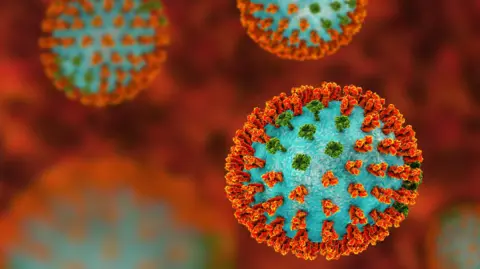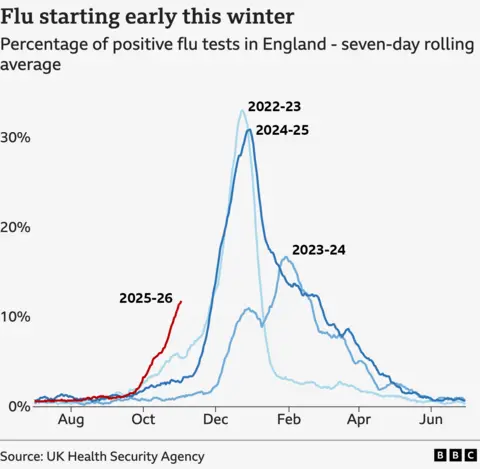
James GallagherHealth and science correspondent
 Getty Images
Getty ImagesListen to James read this article
Flu strikes every winter, but something seems to be different this year.
A seasonal flu virus suddenly mutated in the summer; it appears to evade some of our immunity; has kick-started a flu season more than a month early and is a type of flu that history suggests is more severe.
The NHS has now issued a “flu jab SOS” as fears grow that this will add up to a brutal winter.
There is a lot of nuance and uncertainty, but leading flu experts have told me they would not be shocked if this was the worst flu season for a decade.
“We haven’t seen a virus like this for a while, these dynamics are unusual,” says Prof Nicola Lewis, the director of the World Influenza Centre at the Francis Crick Institute.
“It does concern me, absolutely,” she says. “I’m not panicking, but I am worried.”
So what’s going on? And what can we do?
Scientists track the evolution of influenza viruses because they mutate constantly and the seasonal flu vaccine has to be updated each year to keep up.
This evolution happens in a rhythm known as “shift and drift”.
Most of the time the virus drifts along making minor changes and then every so often there is a sudden abrupt shift as the virus mutates substantially.
That happened in June this year.
Seven mutations appeared in a strain of H3N2 seasonal flu and led to a “fast increase” in reports of the mutated virus, says Prof Derek Smith, the director of the centre for pathogen evolution at the University of Cambridge.
 Getty Images
Getty ImagesUnusually, this happened outside flu season in the middle of the northern hemisphere’s summer.
“It almost certainly will sweep the world, so from that standpoint, it’s something that will come up quickly,” says Prof Smith.
By September, as children went back to school, the nights drew in and the temperatures started to drop, there was an uptick in cases.
Exactly what the mutations are doing is still being explored, but they are probably helping the virus to evade some of the immunity we have built up over years of flu infections and vaccines.
The result is the virus is finding it easier to infect people and spread – that is why the flu season is so early in the UK and other countries including Japan.

If the virus can spread more easily then it does not have to wait for more favourable wintery conditions – when we spend more time indoors with the heating on and the windows shut – to start the flu season.
“We’re miles ahead,” says Prof Lewis, “I think it’s going to be a strong flu season”.
If you remember your R numbers from the pandemic (that is the number of people each infected person passes the virus on to), they suggest the new mutant has an edge.
Seasonal flu usually has an R number of around 1.2, while the early estimate for this year is 1.4, said Prof Lewis.
So very roughly, if 100 people had flu, they would pass it to 120 in a typical year and 140 this year.
Worst flu season for a decade?
“It’s highly likely it’s going to be a bad flu season and it’s going to happen quite soon, we’re already well into it,” says Prof Christophe Fraser, from the Pandemic Sciences Institute at the University of Oxford.
“There are indicators that this could be worse than some of the flu seasons we’ve seen in the last 10 years.”
In a typical flu season around one-in-five of us get infected, but that could be higher this year, he warns.
But all these predictions are still clouded in uncertainty.
Some look to Australia for clues as it had the worst flu season on record this year, although it did not face the same mutated H3N2 we have.
We know the virus is spreading very well in children in the germ-fest that is the school playground.
But the immunity a 10-year-old has developed will be very different from that of their grandparents whose immune defences may have been shaped by six times as many flu seasons.
So, experts will be watching closely as the virus starts infecting older age groups in the coming weeks.
‘It’s a nastier virus’
History suggests that the form of influenza we are facing this year is more severe, particularly for older people.
There are multiple types of flu and you may have heard some of the names like H1N1 swine flu, which caused a pandemic in 2009, or H5N1 which is the current flu killing birds around the world.
The fresh mutations have happened in a group of H3N2 influenzas.
“H3 is always a hotter virus, it’s a nastier virus, it’s more impactful on the population,” said Prof Lewis.
It is worth remembering that some of us will get flu and develop no symptoms at all, while others get a sudden fever, body aches and exhaustion, but the virus can be deadly in older and more vulnerable groups.
Last year, nearly 8,000 people died from flu, and in the 2022-23 flu season there were nearly 16,000 deaths. The NHS is already anticipating a tough flu season.
So what can we do about it?
The clear advice is to get the seasonal flu vaccine – the NHS in England issued a “flu jab SOS” saying there were 2.4 million vaccine slots available in the next week.
 Getty Images
Getty ImagesProf Lewis argues this is “absolutely the most important year” to get vaccinated and that “if you have been called by your GP, please get your flu vaccine as soon as possible”.
However, this year’s vaccine is not a perfect match to the mutated virus.
The decision on the design of the vaccine was made in February to give enough time to produce the millions of doses necessary – and then the new mutant emerged in June.
“Some protection is better than no protection, but this year is likely to be one of the years where the amount of protection is less than it is in years when the match is better, it’s not an ideal situation,” said Prof Fraser.
The vaccine will still trigger the body to produce antibodies that can recognise and stick to flu.
But the biggest benefits are anticipated to be in lessening the severity of the disease rather than stopping you getting ill or slowing the spread of the virus.
And the flu vaccine protects against multiple strains of flu, each of which has the potential to cause their own waves of infections.
“Whatever strains do circulate here this winter, we can be confident that the vaccine will still help give some protection to those most vulnerable from developing serious illness and being hospitalised,” says Dr Mary Ramsay, the director of public health programmes the UK Health Security Agency.
Meanwhile, doctors have been sent advice reminding them that early antiviral treatment reduces the risk of complications from flu.
Japan is also going through an early flu season and has closed schools to help contain outbreaks.
These are not Covid-style lockdowns, but short-term measures the country uses to disrupt the spread of the virus.
Nobody knows for certain what will happen in the coming months.
“It might all go away by next week,” says Prof Lewis, “but I don’t think it will.”







